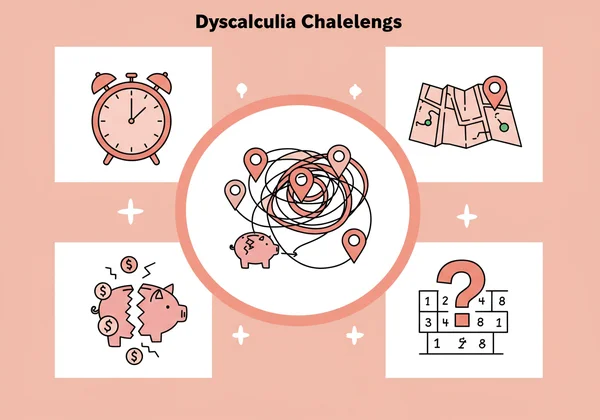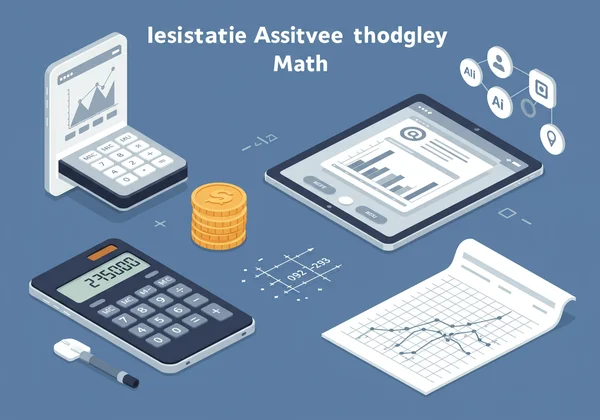Managing Adult Dyscalculia: Strategies & Screening
August 10, 2025 | By Aisha Bennett
Have you ever felt a wave of anxiety when asked to split a bill, calculate a tip, or understand a spreadsheet at work? For many, these aren't just moments of inconvenience but persistent, lifelong struggles. You might have brushed it off as just being "bad at math," but what if it's something more? This is the reality for many adults who live with dyscalculia – a specific learning difference that affects how they understand and work with numbers. The big question is, Do I have dyscalculia or am I just bad at math?
Understanding the root of your challenges is the first step toward empowerment. It's not about finding a label, but about unlocking a roadmap tailored to your unique cognitive style. This guide will walk you through practical strategies for managing adult dyscalculia and show you how a simple dyscalculia test can be the key to unlocking your potential. If you're ready to move from confusion to clarity, you can start your journey to clarity with a supportive first step.

Understanding Dyscalculia in Adults: Beyond "Bad at Math"
Dyscalculia in adults is often called "math dyslexia," but it's a distinct condition. It's a neurological difference that impacts an individual's innate "number sense." This can make it difficult to grasp numerical concepts, from simple arithmetic to more complex mathematical reasoning. It has nothing to do with intelligence; in fact, many adults with dyscalculia are highly intelligent and creative in other areas.
The biggest hurdle for many is recognizing that their struggle is a legitimate learning difference, not a personal failing. For years, you may have developed complex avoidance tactics or felt ashamed of your difficulties. Acknowledging the possibility of dyscalculia is a validating and powerful act of self-awareness.
Common Signs & Daily Impact on Adult Life
The signs of dyscalculia in adults can be subtle and varied, often woven into the fabric of daily routines. You might recognize yourself in these common scenarios:
- Financial Anxiety: Difficulty creating or sticking to a budget, checking bank statements, or calculating interest. You might often overpay or underpay without realizing it.
- Trouble with Time: Struggling to read analog clocks, estimate how long a task will take, or consistently arriving late.
- Directional Confusion: Frequently getting lost, having trouble reading maps, or confusing left and right.
- Workplace Hurdles: Intense anxiety during tasks involving data, financial reports, or scheduling. Remembering phone numbers, codes, or numerical data can feel impossible.
- Everyday Math: Challenges with mental math, calculating a tip, measuring ingredients for a recipe, or understanding statistics in the news.
These challenges can lead to significant stress and a lack of confidence, impacting both personal and professional life. Understanding that these are symptoms of a learning difference can lift a tremendous weight.

Why an Adult Dyscalculia Screening Matters
So, why seek out a dyscalculia assessment? The goal is not just to get a "yes" or "no" answer. A quality screening provides insight. It helps you understand your unique cognitive profile—your specific areas of strength and challenge. This knowledge is the foundation for developing effective, personalized strategies.
When you know why you struggle, you can stop blaming yourself and start finding solutions that work for your brain. For instance, our free AI-powered report goes beyond a basic score, offering a detailed analysis of your cognitive patterns and suggesting tailored strategies. Taking a free dyscalculia screening is a private, accessible way to gain this crucial self-knowledge.
Practical Strategies for Managing Dyscalculia at Work
The workplace can feel like a minefield when numbers are a source of stress. However, with the right approach, you can navigate your career successfully. Managing dyscalculia at work is about leveraging your strengths and implementing smart accommodations.
Many people with dyscalculia excel in creative problem-solving, big-picture thinking, and communication. The key is to create a work environment where these talents can shine, while providing support for numerical tasks.
Navigating Numbers in Meetings & Data Tasks
Meetings filled with charts and figures don't have to be a source of dread. You can use self-advocacy skills to get the information you need in a format that makes sense to you.
- Request Visuals: Ask for data to be presented in clear, simple graphs or charts instead of dense tables.
- Use Technology: Always have a calculator app on your phone or computer. Use spreadsheet formulas to automate calculations and reduce the chance of manual error.
- Ask for Time: If presented with new numbers, it's okay to say, "Thank you for this data. I'd like to take a moment to review it before giving my input." This gives you space to process without pressure.
- Take Notes Your Way: Use colored pens to highlight different figures or draw diagrams to represent numerical concepts.
Effective Communication & Self-Advocacy in the Office
Communicating your needs is a strength, not a weakness. You don't necessarily need to disclose your dyscalculia, but you can advocate for your work style. Frame your requests around efficiency and accuracy.
For example, instead of saying, "I'm bad at math," you could say, "I work most accurately when I can double-check figures, so I'll review these numbers and get back to you," or "To ensure I fully grasp the financial implications, could we visualize this data in a pie chart?" Taking an online dyscalculia test can give you the confidence to understand and articulate these needs.

Dyscalculia Coping Strategies for Daily Life & Finances
Beyond the office, effective dyscalculia coping strategies can dramatically reduce daily stress and build confidence. It's about replacing anxiety with systems that work for you.
From managing money to cooking a meal, a few simple adjustments can make a world of difference. The goal is to offload the mental calculation onto reliable tools and routines, freeing up your cognitive energy for other things.
Mastering Personal Finance & Budgeting with Dyscalculia
Financial management is often the biggest source of anxiety for adults with dyscalculia. The abstract nature of budgets and interest rates can feel overwhelming.
- Embrace Apps: Use budgeting apps that automate tracking and categorize spending visually (like YNAB or Mint).
- Go Digital: Set up automatic bill payments to avoid missing deadlines. Use a debit or credit card for most purchases so there's a digital trail to review.
- Keep it Simple: Use the "envelope system" with cash for discretionary spending or create very simple budget categories (e.g., Needs, Wants, Savings).
- Seek Clarity: When dealing with loans or investments, ask professionals to explain things in simple terms or draw diagrams. Don't be afraid to say, "Can you explain that another way?" Understanding your cognitive profile can help you identify which methods will work best for you.
Time Management, Cooking, & Everyday Math Hacks
Math is hidden in many daily activities. Here are some simple hacks to navigate them:
- Time: Use digital clocks instead of analog. Set multiple alarms and timers on your phone for appointments and tasks.
- Cooking: Use measuring cups and spoons instead of estimating. If you need to double a recipe, write out the new measurements before you start.
- Shopping: Use your phone’s calculator to compare prices per unit or to keep a running total of your cart.
- Directions: Rely on GPS apps that provide verbal, turn-by-turn directions rather than trying to interpret a map while moving.
Leveraging Tools & Support for Adult Dyscalculia
You are not alone in this journey. A wealth of assistive technology and community support is available to help you thrive. Building a toolkit of resources is one of the most empowering things you can do.
Support comes in many forms, from digital apps that simplify calculations to connecting with others who share similar experiences. Finding what works for you is a process of exploration.
Top Digital & Physical Aids for Math Support
Modern technology is a game-changer for managing dyscalculia. Here are a few tools to explore:
-
Calculator Apps: Find one you like and keep it on your home screen. Some talking calculators read the numbers and functions aloud.
-
Graph Paper: Use it to keep numbers and columns aligned when doing manual calculations.
-
Modumath: A software program designed to help users with math challenges.
-
Note-Taking Apps: Use apps like Evernote or OneNote to store important numbers, codes, and formulas for easy access.
-
AI-Powered Insights: The first step is often understanding your own profile. Our personalized AI report can serve as a guide to what kind of tools would benefit you most. Take the first step to discovering them.

Building Your Support System & Finding Community
Sharing your experience can be incredibly liberating. It helps you realize you're not the only one and allows others to understand how they can best support you.
- Talk to Trusted Friends or Family: Explaining your challenges can strengthen your relationships and help them understand why you might struggle with certain tasks.
- Find Online Communities: There are numerous forums and social media groups for adults with learning differences. Hearing others' stories and sharing strategies can be immensely helpful.
- Professional Support: Consider working with a therapist or a coach who specializes in learning differences. They can provide tailored strategies and emotional support.
Your Path to Empowered Living with Dyscalculia
Living with dyscalculia as an adult presents unique challenges, but it does not define your potential for success or happiness. By understanding the nature of this learning difference and implementing practical strategies, you can navigate work and life with greater confidence and ease. It starts with shifting your perspective from "I can't do math" to "I process numbers differently, and I have tools to succeed."
The journey to empowerment begins with knowledge. Understanding your own cognitive landscape is the most critical step. A confidential and insightful screening can provide the clarity you need to move forward.
Are you ready to stop questioning and start understanding? Take our free dyscalculia test today. It’s a simple, supportive first step toward a more empowered life.
Frequently Asked Questions About Adult Dyscalculia & Testing
Do I have dyscalculia, or am I just bad at math?
This is a common and valid question. While many people dislike math, dyscalculia is a persistent, significant difficulty with number sense that impacts daily life beyond the classroom. If you experience deep-seated anxiety, struggle with fundamental concepts like estimating or telling time, and find these challenges affecting your job or financial well-being, it may be more than just being "bad at math." A screening can help you see the patterns more clearly.
What are the main signs of dyscalculia in adults?
Key signs include severe difficulty with mental math, trouble managing finances and budgeting, anxiety when dealing with numbers, issues with time management and reading analog clocks, and challenges with spatial reasoning, like reading maps or judging distances. The impact is typically felt across multiple areas of life, not just in complex math problems.
How can I get tested for dyscalculia as an adult?
Getting tested is more accessible than ever. A formal diagnosis must be done by a qualified psychologist, but an excellent first step is an online screening tool. Our free dyscalculia screening is designed by educational psychologists and math experts to help you identify potential signs privately and conveniently. The results can provide valuable insights and help you decide on next steps for testing for dyscalculia.
Can dyscalculia in adults be cured?
Dyscalculia is a lifelong learning difference, so it cannot be "cured." However, it can be successfully managed. With the right strategies, tools, and support systems, adults with dyscalculia can significantly improve their skills, reduce anxiety, and thrive in their personal and professional lives. The focus is on empowerment and management, not a cure.